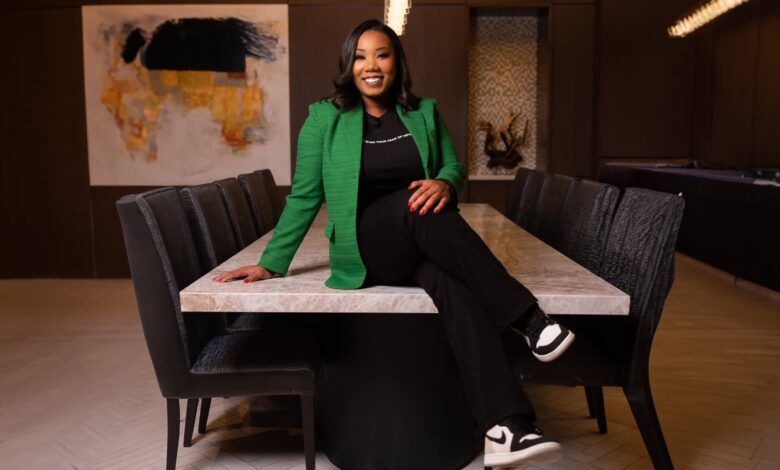33-year-old makes over $100,000, works from home without a degree

It was part of a homework assignment that De’Arcy, a computer science major at Huston-Tillotson University in Austin, Texas, where their family lived, was sprinting to finish.
Computers were still a rarity in her neighborhood at the turn of the millennium. Ansley, then 10 years old, marveled at the neon wires and beaded microchips that lined the hardwood.
“It looked like a puzzle to me, I wanted to know how every piece fit together,” Ansley, 33, recalls. “That’s when I fell in love with tech.”
Ansley followed in her brother’s footsteps and enrolled as a biomedical engineering major at the University of Texas at San Antonio in 2008, but left midway through her freshman year after feeling burned out and uninspired in her classes.
“I felt like I wasn’t getting all of the practical skills or hands-on experience I’d need to work in tech from my classes,” says Ansley. “At that point, I was like, ‘Well, how far can I go without a bachelor’s degree?'”
Now, Ansley is a product manager at a real estate firm based in central Texas.
She works remotely from her home in Houston and earns over $100,000 a year, according to financial documents reviewed by CNBC Make It. Ansley declined to share the name of her employer and exact salary so she could speak freely about her work situation.
Here’s how Ansley built a six-figure career in tech without a bachelor’s degree:
Ansley landed her first corporate job after college as a production assistant at BMF, a creative marketing agency in Austin, by highlighting the soft skills — communication, leadership and time management — she picked up at volunteer gigs and part-time jobs on her resume.
At BMF, Ansley learned two of the most important skills she would later need to become a product manager: problem-solving and working across teams.
“I was responsible for coordinating events at South by Southwest with hundreds of attendees and making sure that my colleagues, the vendors and clients were all doing their jobs, that everyone was happy,” she says.
Ansley knew that to stand out in her field — and compete for future opportunities with people who had bachelor’s degrees — she would need to possess exceptional skills and hands-on work experience.
“Instead of partying on the weekends, I stayed up reading business books or taking online classes in product design and organizational development,” she recalls.
In 2015, after working at BMF for three years, Ansley decided she wanted to gain more technical expertise and quit her job to work at the Texas Windstorm Insurance Association. There, she was a document specialist, organizing and analyzing insurance documents online.
Between 2015 and 2021 she held several marketing and administrative roles at different companies in Austin.
Moving between jobs was more challenging than Ansley anticipated — every time she received a rejection email, she questioned whether or not she had made the right call to leave school.
“It was trial after trial of feeling defeated, I had people close to me tell me I would never make six figures without finishing college,” Ansley recalls. “But ultimately, I didn’t let the ‘no’s discourage me, I used those comments and rejection as motivation to fuel my drive, to go after it and prove the naysayers wrong.”
As Ansley searched for new opportunities, she was never shy about seeking feedback and guidance.
“I responded to almost every job rejection email I received with the same two questions: ‘How can I better present myself as a candidate? What gaps exist on my resume?'” Ansley explains. “People are more receptive than you think to those kinds of requests, they appreciate that you want to get better.”
Ansley says this proactive approach to her professional growth and networking helped her transition from marketing to product management.
In 2020, Ansley saw a LinkedIn post from someone she met through a mutual friend years earlier about leaving marketing to become a product manager. “I still wanted to work in tech, but didn’t know where to start,” says Ansley. “It felt like a sign.”
The author of the post, Kami Smith, encouraged Ansley to study prototyping, data collection, software development processes and other technical skills product managers use before applying to roles. She also offered to recommend Ansley for any openings on her team.
While some companies prefer product managers to have a bachelor’s degree in business management, supply chain management or a related field, it isn’t always required. What’s far more important, says Ansley, are the technical skills, strategic thinking and experience you bring to the table.
Ansley built up her product management experience by volunteering for cross-functional projects, shadowing product managers she worked with and helping colleagues with user testing and market analysis.
True to her word, just a few months after their initial conversation, Smith recommended Ansley for an open associate product manager role on her team — and in August 2021, Ansley started her first job in product management, and first job earning six figures, at the real estate firm where she continues to work today.
Ansley was promoted to product manager at the real estate firm in October 2023.
As a product manager, Ansley is responsible for the internal software the firm’s agents and clients use to track listings and sales. She works with engineers and designers to develop the product, gathers user feedback and makes suggestions for improvements.
“It’s really gratifying to see exactly how your ideas are put into action and help the business’ bottom line,” says Ansley. “I can genuinely say I love my job.”
She maintains a typical 9-to-5 schedule while working from home, sometimes logging on earlier or later depending on her workload.
Some employees at the firm are required to work in the office, but Ansley was hired remotely and given permission to work from home full time. Ansley says she appreciates the flexibility. “If I have an errand I want to run in the middle of the day or work out during my lunch break, I can do that,” she adds.
Product management is a “great career” for someone without a bachelor’s degree to consider, says Ansley, because it leans on transferable skills like project management and data analysis.
“Even if you don’t have the technical background, a lot of companies offer on-the-job training or access to skill-building resources,” she says. “If you’re willing to learn, collaborate with others and are a patient person, you can excel in this job.”
Sometimes, Ansley thinks about going back to college and finishing her bachelor’s degree.
“I don’t think that chapter is closed,” she says. “It’s more about waiting for the right time, and making sure it adds something positive to my life … I’ve finally realized I don’t need a diploma to be successful, I’m already proud of how far I’ve come.”
DON’T MISS: Want to be smarter and more successful with your money, work & life? Sign up for our new newsletter!
Check out:
This 34-year-old makes $100,000 a year without a bachelor’s degree—here’s how



